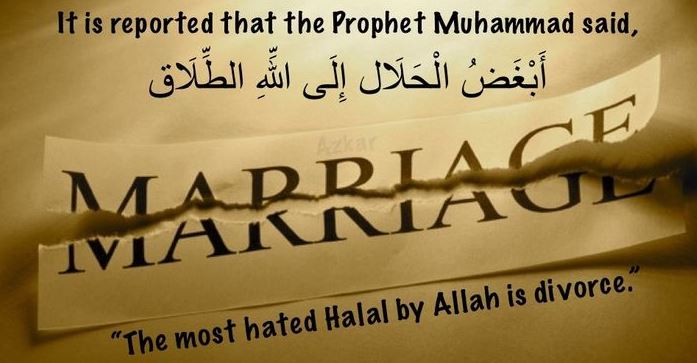QUESTION:
What do the scholars of the Dīn and muftīs of the Sacred Law state regarding the following issue: A husband and wife were quarrelling and the husband said only the following words to his wife, ‘divorced, divorced’ he did not mention whether he is giving it [i.e. the divorce] or will give it. Nevertheless, he did have the intention in his heart of divorcing his wife, so in this case, would divorce occur or not. If divorce has occurred, then how many divorces have occurred with these words?
Questioner: Ghulaam Rasool from England, U.K.
ANSWER:
بسم الله الرحمن الرحیم
الجواب بعون الملک الوھاب اللھم ھدایة الحق والصواب
It is essential for the words of divorce to be in relation, linked, associated and attributed to the wife in order for divorce to occur; regardless of whether the link was in terms of words [i.e. verbal] or in the heart [i.e. in terms of intention]. For instance, the husband said the words ‘divorce, divorce, divorce’ to his wife with the intention of divorcing, then even though there is no indication of divorce to his wife in wording, however because there is the intention of him divorcing his wife, hence the attributing is found and divorce will occur.
Therefore, in the aforementioned scenario, if these words ‘divorced, divorced’ are said twice [i.e. as quoted], then two revocable divorces will occur. Having retracted during the ‘Iddah [waiting period], they may live together; and if the waiting period finishes without retraction, then they cannot live together unless they re-marry [i.e. re-perform Nikāh]. Nevertheless, he may marry the woman with her consent without Halālah, and now he has the option of only one divorce left, if he ever divorces her [once more] during his lifetime, then this will become a Mughallazhah [i.e. binding] divorce and then there will be no other case of retracting other than an Islamic [i.e. legally valid] Halālah.
Note
The word ‘divorce’ in the English language is explicitly clear and the words of divorce are in relation to explicitness and clarity.
Sadr al-Sharī’ah, Badr al-Tarīqah, the dear respected Mawlānā Amjad ‘Alī A’zhamī – may his soul be sanctified – states in reply to a question asked of this kind in Fatāwā Amjadiyyah, ‘Attribution is essential in order for divorce to occur, be it explicit or implicit. If the husband intended to divorce that very wife of his with those words, then divorce will definitely occur, otherwise not.’
[Fatāwā Amjadiyyah, vol. 2, pp. 230-231]
And in some cases, if there is a sign or indication of referring to the wife in the wording of divorce without specifically addressing her, then this sign or indication is enough for the intention and a ruling-wise divorce will occur in this case. However, if – in the sign or indication case – the husband denies intending divorce by means of oath, then ruling-wise what he is saying will be considered and taken into account, and the ruling of divorce occurring will not be given.
Just as Sayyidī A’lāhadrat, the Imām of the Ahl al-Sunnah, al-Shāh Imām Ahmad Ridā Khān – upon whom be mercy – after mentioning the cases of attributing divorce in terms of wording, he states mentioning the cases of attributing in terms of meaning,
“‘اماقضاءًفتنقسم ھذہ الصورۃ الی قسمین:الاول ان توجد ھنا قرینۃ، لیستأنس بھا علی تحقق النیۃ ویکون ھو الاظھرفی المقام فحینئذ یحکم بالوقوع مالم یقل انی لم اردھا، فان قالہ فلا یصدق الابالیمین ،فان حلف صدق، لکونہ امینا فی الاخبار عما فی نفسہ وقد اتی بمایحتملہ کلامہ۔۔۔۔۔۔ الثانی ان لاتکون ھنا قرینۃ ذٰلک وحینئذ یتوقف الوقوع علی اخبار ہ بالنیۃ فان اقروقع والا لا'(ملتقطاً)”
In other words, “The ruling and judging of attributing without words; this consists of two types: The first is such a case in which there is such an indication or sign present for which it can be ascertained that the husband has intended divorce. And this can be made clear by considering the situation & scenario, so the ruling of divorce occurring will be applied until the husband actually says that ‘I did not intend my wife’, and if he said as so, then he will not be considered truthful or credible [in this regard] unless he swears an oath. If he denies it by swearing an oath, then he will be deemed truthful and credible [in this regard] because he is trustworthy and authorised in relation to his [own] intention, and what he is saying also has another possibility as well [i.e. to mean something else other than divorce]. The second type is where an indication or sign is not found there, so divorce occurring will be kept pending until the husband says ‘I intended the divorce of my wife’, hence if there is admission of intending to divorce the wife, then divorce will occur, otherwise not.”
[Taken from Jadd al-Mumtār ‘Alā Radd al-Muhtār, vol. 5, pp. 30-32]
Sayyidī A’lāhadrat, the Imām of the Ahl al-Sunnah, al-Shāh Imām Ahmad Ridā Khān – upon whom be mercies – giving an answer to a similar kind of question states in Fatāwā Ridawiyyah, ‘If he merely said the words that “divorce, divorce, divorce”, neither did he say he gave the divorce, nor does he say “to you” or “this/that woman”, nor were these words in response to such a matter/conversation or discussion which consisted of the topic or understanding of giving divorce to the woman, then divorce has not occurred in essence. She is still his wife; there is no need to re-perform the Nikāh again. And if, alongside this or in this matter which was said in response to these words, there is that word present from which it is understood that he has divorced his wife, or if he himself admits that “I intended to divorce my wife with these words,” then it will be three divorces; without Halālah, she cannot enter into his marriage.’
[Fatāwā Ridawiyyah, vol. 12, p. 392]
والله تعالی أعلم ورسوله أعلم صلی الله علیه وآله وسلم
کتبه أبو الحسن محمد قاسم ضیاء القادري
Answered by Mufti Qasim Zia al-Qādiri
Translated by Haider Ali al-Madanī
Read the original Urdu answer here: [Q-ID0867] My Husband said ‘divorced, divorced’ to me, has divorce occured?






















![[Q-ID0189] My Husband said ‘I divorce you’ three times, on different occasions. Has divorced occurred?](http://www.seekerspath.co.uk/wp-content/themes/hueman-pro/assets/front/img/thumb-medium-empty.png.pagespeed.ce.q0RS_Oe2Ar.png)









